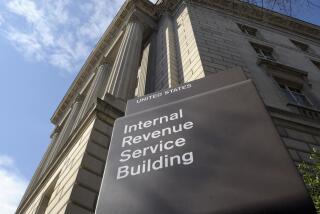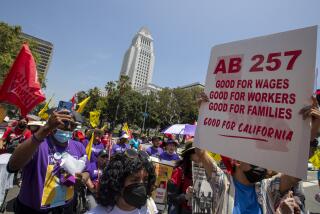Tax Vote Shows Growing Clout of Small Business
- Share via
This week’s House approval of a bill to abolish the complicated U.S. Tax Code may be a longshot to make it into law. But it’s a bull’s-eye for the small-business lobby on Capitol Hill.
A far-flung signature campaign initiated last fall by the National Federation of Independent Business (NFIB) culminated Wednesday in a narrow 219-209 victory for the measure, which requires Congress to scrap the current code by 2002 in favor of something simpler.
Skeptics say Wednesday’s vote amounts to little more than election year grandstanding by politicians who know the bill hasn’t a prayer of becoming law. And there is plenty of dissent within the small-business community, with some trade groups echoing President Clinton, who has condemned the measure as “reckless and irresponsible.”
Still the vote underscores the growing influence of small-business advocates inside the Beltway. And it’s a huge win for the 600,000-member NFIB and Jack Faris, its folksy president who was likened to Don Quixote when he began pressing the issue last year.
“The windmill is real,” said an elated Faris in a telephone interview from Washington. “The real insanity is thinking we can fix the code we’ve got. We’re not letting up until we have a new one.”
Many Americans resent the current Tax Code, but perhaps none more than the nation’s small-business owners. Their complicated returns are audit magnets for the IRS, yet they can ill afford the blue-chip tax advice obtained by large companies.
Building on the momentum begun in 1996 by presidential candidate and flat-tax advocate Steve Forbes, the NFIB last September began a campaign of its own to scrap and simplify the current system. With the battle cry, “It’s our money, not theirs,” the group set out to obtain 1 million signatures from disgruntled taxpayers to present to Congress.
Small-business volunteers fanned out to shopping centers and stadiums nationwide, while Faris barnstormed the country to meet with editors and reporters in 75 cities. The effort ultimately netted some 750,000 signatures, which the NFIB delivered to Washington lawmakers this week in made-for-media style: in thousands of boxes piled on the back of a flatbed truck.
Wednesday’s squeaker House vote followed party lines, with just 15 Democrats joining the Republicans in supporting the bill. But that may be the end of the line. In the unlikely event the measure is approved in the Senate, President Clinton has vowed to veto it, fearing financial chaos if the system is set for demolition with nothing concrete planned to replace it.
Faris and the NFIB argue that a sunset deadline is needed to propel Congress to action. But other small-business advocacy groups, including the 325,000-member National Assn. for the Self Employed (NASE) and National Small Business United (NSBU), with 65,000 members, oppose the idea.
“Scrapping the Tax Code with nothing to replace it is the mother of all uncertainties,” said NSBU President Todd McCracken. “We don’t put it past [Congress] to come up with something worse.”
Other small-business watchers grumble that the effort was nothing more than a grand publicity stunt orchestrated by the Republicans in concert with the NFIB. The GOP gets to put the Democrats in the awkward position of defending the indefensible in an election year, without having to offer up a solution of its own.
But Karen Kerrigan, president of the 40,000-member Small Business Survival Committee, credits NFIB for keeping Tax Code reform in the public eye: “They’ve moved the issue forward and kept it an important part of the debate. But the tough question is what kind of tax system you replace it with.”
Whatever the final outcome, Wednesday’s vote underscores the growing influence of the small-business lobby on Capitol Hill.
Earlier this year, Fortune magazine rated the NFIB among the top five pressure groups in its “Power 25” list of the lobbying elite. The magazine ranked the NFIB fourth, close behind the top-rated powerhouse American Assn. of Retired Persons and ahead of such stalwarts as the Assn. of Trial Lawyers in America, the National Rifle Assn. of America and the Christian Coalition.
The NFIB doesn’t do it with bags of money. To gather the 750,000 signatures in its Tax Code reform drive, the group relied on volunteers and spent a mere $460,000--”dinner money in Washington,” noted Faris.
Instead, the NFIB and other small-business groups deliver grass-roots organization and lots of vocal voters. These organizations played an active role in defeating national health care, winning business regulatory relief and, ironically, in securing recent Tax Code changes that have benefited small-business owners.
Meanwhile, Faris is vowing to carry on with his mission until no windmill--or the Tax Code--is left standing: “If you think this is an election year ruse, just watch us. We’re not going away.”
More to Read
Inside the business of entertainment
The Wide Shot brings you news, analysis and insights on everything from streaming wars to production — and what it all means for the future.
You may occasionally receive promotional content from the Los Angeles Times.










